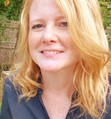Michelle Hauck's Blog, page 44
April 8, 2016
Rewind Week: Super Queries
I'm on vacation this week, so I'm rewinding some of my favorite posts about editing:
I won't claim to be an expert, despite hosting many query contests (Query Kombat, New Agent, Sun versus Snow, PitchSlam and Nightmare on Query Street), but I have read a fair share of queries. I've also written my share and critiqued dozens. So these are some tips from a quasi-amateur on what works in a query and first page.

Much of querying is going to be subjective. Happening to have that concept an agent is on the lookout for. Using the name of an agent's pet cat without knowing it. Setting your story in an agent's favorite vacation spot. Matching the sense of humor of an agent or their love of a dark tale.
Beyond creating a top notch concept which is super marketable, those are things that are serendipity. Entirely based upon luck and for which you can't plan. (Though you can research. Getting to know something about agents will help you gear your query toward an agent.) These are not always things you can write into your query letter and first page. But there are things you can do to make your query stronger.
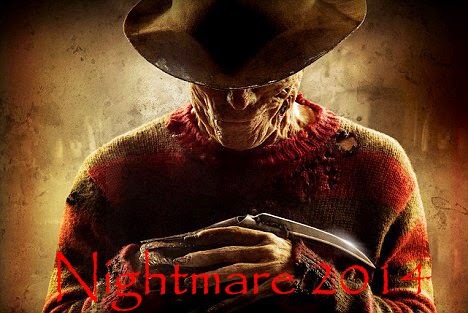
The Foundations of a Good Query:
Much has been said about the benefit of a strong beginning hook. A hook is important, but the query will fall apart if the rest of the paragraphs let it down. Here are some other things that matter.
Be Clean: First off, the simplest advice. You want to catch those typos and missing words. You want to be sure your have commas where they belong. Which means get some unbiased eyes to examine your query for mistakes. Mistakes in a query and first page will hurt your chances. (More on first pages in another post.)
Motivation: The reader needs to be able to determine what makes your main character tick. There should be something in the query to show why your character needs to react. What is propelling them forward, instead of sitting at home? Maybe their family is in danger. Maybe they want to regain their memory. Maybe they'll do anything to find love. But there has to be a reason, because that reason tells us something about your character. It's what will make us care about them, or on the other side, hit delete if the motivation is not there.
Stakes: It's not enough to tell us why a character has to accomplish something. You have to tell us what happens if they fail and what happens if they succeed. In other words, nail the worst case scenario and the best. And, the difficult part, you have to be specific when you do this. No generic cliche is going to catch someone's attention among the hundreds of queries out there.
Avoid side plots: Stay away from venturing too far from the main plot/concept. A good book is going to be full of other things that the main character desires and complications that arise. Those should definitely be in the story, but they only make the query confusing. Avoid confusion. Focus on your main problem. The only exception being to include any romance that might be blossoming. That can usually be done in a query without being distracting.
Limit Named Characters: Another way to keep the query on track is to only name a very few characters. Keep it simple with identifying characters. The last thing you want is an agent going who is this guy again? They have enough to remember.
Three is a good number of names to stick to. Too many names and places slow down a query and make it difficult to follow. That's not to say you can't use general identifiers like: her parents, work friends, humpbacked lab assistant. That fixes the relationship with the main character without bogging the query with a lot of names.
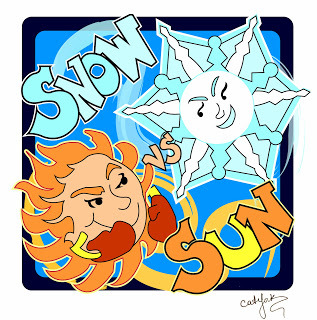
Creating a Super Query:
Beyond the basics what can you do to make your query stand out above the hundreds that are out there? These are the sort of things that make the difference between a strong query and a super query that gets you into contests.
Voice: The best and most effective way to make your query stand out is to fill it with voice. Let the attitude of your character shine. The query should almost seem to be coming out of their mouth. (Of course you need to stay in third person, which is why this is hard.)
And why is that good? Because it shows us what your main character is like. You know the saying, 'that's a man I'd like to have a beer with.' That's what you're going for with voice. Convincing us this character is someone we want to spend time with. You are putting your character's personality on display by the words and slang you use in your query.
Details: I touched on this in the stakes section, but I can't stress it enough. Be specific in your details. There's nothing more boring than a bunch of cliche lines. She has to save the day. He must rise to the challenge. Save what? Rise to what? Don't be cagey, tell us.
And the details should go beyond the stakes. Why? Because details show about a character. I remember one entry (first page) in Query Kombat that I picked specifically because of a mention of a pink flipflop and the noise being something her mom hated. That shows me something about the main character!
Make sure you use the right sort of details that make your character interesting, that bring out something about them. The wrong sort of details just make a query confusing as mentioned under avoiding side plots and extra names.
Set the tone: This might relate more to me, a subjective thing, but I like a query and/or first page with humor. If you book is humorous then that should be on display in your query. Conversely, if your story is dark, your query should reflect that.
Use the query to set the mood. In a query, the rules about avoiding adjectives don't apply so strictly. A query is short. You need to use the space you have and that means resorting to adjectives at times. They can be useful both for setting the tone and for creating voice.
Unique: Most of the information in this bottom section has been about establishing the personality of your main character and carrying that into the query. Focus on what makes your book unique. Being sure to detail what is unique about your story is another way to enlarge our knowledge about the character, but it can also go beyond characters.
If you story is set in a unique location, make sure you include that. If there is something different about your plot, make sure we know.
And warning: Don't hide things as a 'surprise' for the reader by keeping them from your query. (Except for endings and big twists.) If your query doesn't hook, there's not going to be a second chance to awe us.
I heard from lots of people that didn't want to give too much away in a query. If the query doesn't hook us, it's not doing it's job. Like using specific details, unique qualities in your story are too important to save for later.
A super query goes beyond the motivation, plot, and stakes of a story. A super query gives us a sense of personality, mood, and uniqueness. A super query makes us want to know more, makes us care.
So there you have it. An incomplete--I'm sure--list of ways to make your query stronger. I hope it helps make creating your query a little easier and gives you more confidence.
What's the best advice you've every had on a query?
I won't claim to be an expert, despite hosting many query contests (Query Kombat, New Agent, Sun versus Snow, PitchSlam and Nightmare on Query Street), but I have read a fair share of queries. I've also written my share and critiqued dozens. So these are some tips from a quasi-amateur on what works in a query and first page.

Much of querying is going to be subjective. Happening to have that concept an agent is on the lookout for. Using the name of an agent's pet cat without knowing it. Setting your story in an agent's favorite vacation spot. Matching the sense of humor of an agent or their love of a dark tale.
Beyond creating a top notch concept which is super marketable, those are things that are serendipity. Entirely based upon luck and for which you can't plan. (Though you can research. Getting to know something about agents will help you gear your query toward an agent.) These are not always things you can write into your query letter and first page. But there are things you can do to make your query stronger.

The Foundations of a Good Query:
Much has been said about the benefit of a strong beginning hook. A hook is important, but the query will fall apart if the rest of the paragraphs let it down. Here are some other things that matter.
Be Clean: First off, the simplest advice. You want to catch those typos and missing words. You want to be sure your have commas where they belong. Which means get some unbiased eyes to examine your query for mistakes. Mistakes in a query and first page will hurt your chances. (More on first pages in another post.)
Motivation: The reader needs to be able to determine what makes your main character tick. There should be something in the query to show why your character needs to react. What is propelling them forward, instead of sitting at home? Maybe their family is in danger. Maybe they want to regain their memory. Maybe they'll do anything to find love. But there has to be a reason, because that reason tells us something about your character. It's what will make us care about them, or on the other side, hit delete if the motivation is not there.
Stakes: It's not enough to tell us why a character has to accomplish something. You have to tell us what happens if they fail and what happens if they succeed. In other words, nail the worst case scenario and the best. And, the difficult part, you have to be specific when you do this. No generic cliche is going to catch someone's attention among the hundreds of queries out there.
Avoid side plots: Stay away from venturing too far from the main plot/concept. A good book is going to be full of other things that the main character desires and complications that arise. Those should definitely be in the story, but they only make the query confusing. Avoid confusion. Focus on your main problem. The only exception being to include any romance that might be blossoming. That can usually be done in a query without being distracting.
Limit Named Characters: Another way to keep the query on track is to only name a very few characters. Keep it simple with identifying characters. The last thing you want is an agent going who is this guy again? They have enough to remember.
Three is a good number of names to stick to. Too many names and places slow down a query and make it difficult to follow. That's not to say you can't use general identifiers like: her parents, work friends, humpbacked lab assistant. That fixes the relationship with the main character without bogging the query with a lot of names.

Creating a Super Query:
Beyond the basics what can you do to make your query stand out above the hundreds that are out there? These are the sort of things that make the difference between a strong query and a super query that gets you into contests.
Voice: The best and most effective way to make your query stand out is to fill it with voice. Let the attitude of your character shine. The query should almost seem to be coming out of their mouth. (Of course you need to stay in third person, which is why this is hard.)
And why is that good? Because it shows us what your main character is like. You know the saying, 'that's a man I'd like to have a beer with.' That's what you're going for with voice. Convincing us this character is someone we want to spend time with. You are putting your character's personality on display by the words and slang you use in your query.
Details: I touched on this in the stakes section, but I can't stress it enough. Be specific in your details. There's nothing more boring than a bunch of cliche lines. She has to save the day. He must rise to the challenge. Save what? Rise to what? Don't be cagey, tell us.
And the details should go beyond the stakes. Why? Because details show about a character. I remember one entry (first page) in Query Kombat that I picked specifically because of a mention of a pink flipflop and the noise being something her mom hated. That shows me something about the main character!
Make sure you use the right sort of details that make your character interesting, that bring out something about them. The wrong sort of details just make a query confusing as mentioned under avoiding side plots and extra names.
Set the tone: This might relate more to me, a subjective thing, but I like a query and/or first page with humor. If you book is humorous then that should be on display in your query. Conversely, if your story is dark, your query should reflect that.
Use the query to set the mood. In a query, the rules about avoiding adjectives don't apply so strictly. A query is short. You need to use the space you have and that means resorting to adjectives at times. They can be useful both for setting the tone and for creating voice.
Unique: Most of the information in this bottom section has been about establishing the personality of your main character and carrying that into the query. Focus on what makes your book unique. Being sure to detail what is unique about your story is another way to enlarge our knowledge about the character, but it can also go beyond characters.
If you story is set in a unique location, make sure you include that. If there is something different about your plot, make sure we know.
And warning: Don't hide things as a 'surprise' for the reader by keeping them from your query. (Except for endings and big twists.) If your query doesn't hook, there's not going to be a second chance to awe us.
I heard from lots of people that didn't want to give too much away in a query. If the query doesn't hook us, it's not doing it's job. Like using specific details, unique qualities in your story are too important to save for later.
A super query goes beyond the motivation, plot, and stakes of a story. A super query gives us a sense of personality, mood, and uniqueness. A super query makes us want to know more, makes us care.
So there you have it. An incomplete--I'm sure--list of ways to make your query stronger. I hope it helps make creating your query a little easier and gives you more confidence.
What's the best advice you've every had on a query?
Published on April 08, 2016 04:30
April 7, 2016
Getting the Call with Aden Polydoros
A ripping success story from Nightmare on Query Street! And I'm going to add that Aden got his call within days! That was just amazing!

I wrote my first book several years ago. At the time, I believed that the bigger the book was, the better, and managed to inflate what should have been a 70k story to close to 90k words. I sent it out to around thirty agents, probably more, and it received no requests and very few actual responses. Discouraged, I put the manuscript aside.
Over the next two years, I tried to write other novels, but I rarely got past the beginning. I was afraid that if I wrote another book, it would never be published and I would have ended up wasting half a year of my life obsessing over it. (Now I know better—even if a book is never published, you still gain experience from writing it.) Luckily, I had an excellent English teacher who encouraged me to keep writing and told me that one day I would become a published author. With his support, I convinced myself to give it another shot.
In the beginning of 2015, I began working on a YA thriller. I probably went through an entire economy-sized bottle of ibuprofen in the several months I spent writing the first draft. When I was done writing the story and polishing it up, I sent it out to agents. I had done my research this time, and I made sure to personalize my query letters and send the story only to agents who represented its genre. This time, I was a little luckier; after a few rounds of querying, I received some partials and one full. I also sent it to one publisher, Entangled.
I found out about Query Kombat through a link in the Absolute Write forum. I submitted my manuscript and was chosen. Through the contest, I received two full requests and three partials.
One by one, the agent requests were all rejected.
While I continued querying the first manuscript, I wrote a YA suspense novel called The Garden. Out of the several full requests I received, one was a R&R. The agent told me the protagonist was inactive. I cut out over 30k words (i.e. half the book) and rewrote the story so that the MC was less passive and had more at stake. Several months after finishing the revisions, I submitted The Garden to Nightmare on Query Street.
One of the two agents to ask for a full request in NoQS was Mallory Brown. I sent the manuscript to her on October 30th. On November 1st, while eating dinner at the school dining hall, I checked my emails on my phone. When I saw Mallory’s email, I thought I was going to break my previous record for # of rejections in a day. Then I read the subject line: OFFER OF REPRESENTATION.
I arranged to speak with Mallory the next day. Because of my class schedule and the difference in time zones, I woke up at 4 AM to call her at 5. I was extremely nervous and probably made a stuttering fool out of myself. By the time we finished the call, I half-expected her to rescind the offer and file a restraining order against me—okay, exaggerations aside, the call didn’t go that bad. I was thrilled to hear how much she liked my story, and glad to know that we shared the same vision for it.
Interestingly, several weeks after signing with Mallory, I received a response from the publisher I had sent the first manuscript to. This month, I signed with them for a two book deal.
--------------------------------
Aden Polydoros grew up in Long Grove, Illinois, and now lives in Arizona. He is a writer of young adult fiction. When he isn’t writing, he enjoys reading and going on hikes in the mountains. Aden's first book, PANDORA FROM THE CLAY, is due for Summer 2017 from Entangled Publishing. @AdenPolydoros

I wrote my first book several years ago. At the time, I believed that the bigger the book was, the better, and managed to inflate what should have been a 70k story to close to 90k words. I sent it out to around thirty agents, probably more, and it received no requests and very few actual responses. Discouraged, I put the manuscript aside.
Over the next two years, I tried to write other novels, but I rarely got past the beginning. I was afraid that if I wrote another book, it would never be published and I would have ended up wasting half a year of my life obsessing over it. (Now I know better—even if a book is never published, you still gain experience from writing it.) Luckily, I had an excellent English teacher who encouraged me to keep writing and told me that one day I would become a published author. With his support, I convinced myself to give it another shot.
In the beginning of 2015, I began working on a YA thriller. I probably went through an entire economy-sized bottle of ibuprofen in the several months I spent writing the first draft. When I was done writing the story and polishing it up, I sent it out to agents. I had done my research this time, and I made sure to personalize my query letters and send the story only to agents who represented its genre. This time, I was a little luckier; after a few rounds of querying, I received some partials and one full. I also sent it to one publisher, Entangled.
I found out about Query Kombat through a link in the Absolute Write forum. I submitted my manuscript and was chosen. Through the contest, I received two full requests and three partials.
One by one, the agent requests were all rejected.
While I continued querying the first manuscript, I wrote a YA suspense novel called The Garden. Out of the several full requests I received, one was a R&R. The agent told me the protagonist was inactive. I cut out over 30k words (i.e. half the book) and rewrote the story so that the MC was less passive and had more at stake. Several months after finishing the revisions, I submitted The Garden to Nightmare on Query Street.
One of the two agents to ask for a full request in NoQS was Mallory Brown. I sent the manuscript to her on October 30th. On November 1st, while eating dinner at the school dining hall, I checked my emails on my phone. When I saw Mallory’s email, I thought I was going to break my previous record for # of rejections in a day. Then I read the subject line: OFFER OF REPRESENTATION.
I arranged to speak with Mallory the next day. Because of my class schedule and the difference in time zones, I woke up at 4 AM to call her at 5. I was extremely nervous and probably made a stuttering fool out of myself. By the time we finished the call, I half-expected her to rescind the offer and file a restraining order against me—okay, exaggerations aside, the call didn’t go that bad. I was thrilled to hear how much she liked my story, and glad to know that we shared the same vision for it.
Interestingly, several weeks after signing with Mallory, I received a response from the publisher I had sent the first manuscript to. This month, I signed with them for a two book deal.
--------------------------------
Aden Polydoros grew up in Long Grove, Illinois, and now lives in Arizona. He is a writer of young adult fiction. When he isn’t writing, he enjoys reading and going on hikes in the mountains. Aden's first book, PANDORA FROM THE CLAY, is due for Summer 2017 from Entangled Publishing. @AdenPolydoros
Published on April 07, 2016 04:30
April 6, 2016
Rewind Week: Commas with Interjections and Direct Address
I'm on vacation, so I'm rewinding some of my favorite editing posts:
Commas. Just when you think you've found where they all belong, there's another rule to confuse things.
Most people seem to know about using commas in a list (the Oxford comma), or including commas before conjunctions (or, but, and, so, if) connecting two independent clauses. But you also need commas when your sentence directly addresses someone or contains an interjection.
Some examples.
"Look out for that giant boulder, Rodger!""Rodger, look out for that giant boulder!"
Assuming the speaker took the time to say all this, they are directly addressing the soon-to-be-squished Rodger. A comma is needed before or after his name depending on the location of the name. Also notice that the people or person being addressed don't have to be called by name. A comma is still required even if the object isn't named.
"Everyone, look out for that giant boulder!""Look out for the giant boulder, everyone!"
"I love you, my little squishy face."Butt head, that's my toe you're standing on." "Rodger never gets squished by boulders at home."
Conversely, here the speaker is only talking about Rodger, not to him, so no commas are needed.
"Geez, Mom, you're embarrassing me."
This sentence has two reasons for commas. First, you have an interjection that requires a comma and second this sentence is addressing someone. When the person being addressed is in the center of a sentence, they are offset by commas.
"Cool beans, Rodger, on becoming the next Flat Stanley."
An interjection is an add-on to the front, middle, or end of a sentence used to exclaim, protest, or command. Depending on how strong the exclaimation, it may or may not be its own sentence.
"Gee, that's swell.""Hooray! That's swell!""Shit, Rodger was squished by a boulder.""Oh, it got my toe, too!""Ow! It got my toe, too!""Being flat may be useful, but it's hard to kiss that way, isn't it?""Yes, I'm going to Rodger's funeral.""Rodger should have listened to me, right?""Indeed, that was a bad day for Rodger.""Well, he's at peace now."
Interjections can be a great way to break up your sentence structure and avoid monotony. Addressing characters in your sentences can help avoid confusion when multiple speakers are involved. Just remember the commas!
Commas. Just when you think you've found where they all belong, there's another rule to confuse things.
Most people seem to know about using commas in a list (the Oxford comma), or including commas before conjunctions (or, but, and, so, if) connecting two independent clauses. But you also need commas when your sentence directly addresses someone or contains an interjection.
Some examples.
"Look out for that giant boulder, Rodger!""Rodger, look out for that giant boulder!"
Assuming the speaker took the time to say all this, they are directly addressing the soon-to-be-squished Rodger. A comma is needed before or after his name depending on the location of the name. Also notice that the people or person being addressed don't have to be called by name. A comma is still required even if the object isn't named.
"Everyone, look out for that giant boulder!""Look out for the giant boulder, everyone!"
"I love you, my little squishy face."Butt head, that's my toe you're standing on." "Rodger never gets squished by boulders at home."
Conversely, here the speaker is only talking about Rodger, not to him, so no commas are needed.
"Geez, Mom, you're embarrassing me."
This sentence has two reasons for commas. First, you have an interjection that requires a comma and second this sentence is addressing someone. When the person being addressed is in the center of a sentence, they are offset by commas.
"Cool beans, Rodger, on becoming the next Flat Stanley."
An interjection is an add-on to the front, middle, or end of a sentence used to exclaim, protest, or command. Depending on how strong the exclaimation, it may or may not be its own sentence.
"Gee, that's swell.""Hooray! That's swell!""Shit, Rodger was squished by a boulder.""Oh, it got my toe, too!""Ow! It got my toe, too!""Being flat may be useful, but it's hard to kiss that way, isn't it?""Yes, I'm going to Rodger's funeral.""Rodger should have listened to me, right?""Indeed, that was a bad day for Rodger.""Well, he's at peace now."
Interjections can be a great way to break up your sentence structure and avoid monotony. Addressing characters in your sentences can help avoid confusion when multiple speakers are involved. Just remember the commas!
Published on April 06, 2016 04:30
April 4, 2016
ReWind Week: Make Your Characters Likable
I'm on vacation, so I'm rewinding some of my favorite editing posts:
So at the beginning of your novel, your main character is a bitch or a bastard, is selfish or whiny, is bratty or works at an immoral job, or is just plain mean. Maybe they're an antihero, maybe they have a character arc to fulfill before they can join the human race. How do you keep readers from turning away in the first chapters? Some tricks can help you build a connection between your readers and your character and build sympathy. A few tweaks can get people to keep reading.
Here are the ideas that occur to me or that I've used myself:
1. Love something passionately Your character is selfish. They don't have any friends or very few. They're bitter and closed off. Give them something they do love and care about. A famous example of this is Katniss Everdeen from the opening of The Hunger Games. Deep down you know she's not a very sympathetic person. She thinks about her and her family and nobody else. But she loves her sister and so do you. Who couldn't love her after the duck thing with Prim's shirttail. Just make sure the audience also loves this person or pet. Yep, pets are great for this.
I've used this myself in Kindar's Cure. Kindar can't get along with her hateful family. She argues and speaks unkindly to her younger sister. To protect herself she must stay closed off and not reveal her feelings. But she loves her royal staff and does what she can to shield them from her mother's wrath. And she is also fond of her older sister.
2. Act of kindness Your character is a jerk. They're not very thoughtful. Like the shirttail episode between Katniss and Prim, have your character do an unnecessary act of kindness. They're awful to anyone and everyone, but they hold the door open for an old lady. They stop a kid from running into the road. They give up their seat on a bus to a handicapped person. They pick up some litter or do the dishes at home. They do something that makes a reader consider this character may be redeemable after all.
I've used this also. After a fight with her family, I have a character do the dishes as a goodwill gesture. Small sure. But maybe just enough when combined with the other tricks listed here.
3. Experience doubt/remorse Your character argues constantly with their parents or your character does has an immoral job- assassin, spy, thief. Have them experience some doubts about their choice of action. Put some question into their thoughts. "Am I doing the right thing?" Have them feel bad about fighting or being disrespectful--at least in their own thoughts--even if not voiced aloud. Maybe they still believe they are in the right, but they don't feel happy about their actions.
What could be more human than to have doubt and remorse. We all do it and can connect with it. Even as she fights, I had the character in number two feeling bad about the arguing. She stands by her belief that she's right, but she's not happy to have hurt her family.
4. Make them interesting If you can't beat 'em, join 'em. Your character is evil brought to Earth and has no good qualities. So make them fascinating. They do the unexpected. They keep the reader guessing. They have a compelling and attractive voice that stands out in a crowd. They'd make the cover of Time with their sheer unpredictability and gotta see what they do next.
5. Make everything else interesting In the vein of the last idea, your main character is a putz that nobody is going to like, but your world and plot is going to keep people reading. You make your world building so new and unique that nobody gives a crap that they hate your character. Or your plot is so nonstop that there's no time to pause in reading to consider if they like your protagonist.
Give readers something always new and fast paced and hope that's enough for them.
6. Paint them in a corner Your main character is no Mother Teresa, but you put them in such danger or into such a tight place that readers are instantly rooting for them. Get readers hoping your character makes it out alive and you've won half the battle.
I also did this in Kindar's Cure. I hit Kindar with one terrible thing after another in the opening chapters until she was literally forced to flee her home.
7. They ain't the worst Hand and hand with number six, goes this tip. Your character is unsympathetic but all the other character are even more distasteful. Your character looks good by comparison. I've seen this done a lot in darker stories. I'm guessing this is a GRRM tactic.
Many of my main characters seem to start out as not the most reader friendly. So there are the ideas that rattle around in my noggin or that I've employed without even thinking about it. Consider using one or a combination of these for your own characters.
Or maybe you have your own tricks and tips. What have you used or noticed being used to make a character likable?
So at the beginning of your novel, your main character is a bitch or a bastard, is selfish or whiny, is bratty or works at an immoral job, or is just plain mean. Maybe they're an antihero, maybe they have a character arc to fulfill before they can join the human race. How do you keep readers from turning away in the first chapters? Some tricks can help you build a connection between your readers and your character and build sympathy. A few tweaks can get people to keep reading.
Here are the ideas that occur to me or that I've used myself:
1. Love something passionately Your character is selfish. They don't have any friends or very few. They're bitter and closed off. Give them something they do love and care about. A famous example of this is Katniss Everdeen from the opening of The Hunger Games. Deep down you know she's not a very sympathetic person. She thinks about her and her family and nobody else. But she loves her sister and so do you. Who couldn't love her after the duck thing with Prim's shirttail. Just make sure the audience also loves this person or pet. Yep, pets are great for this.
I've used this myself in Kindar's Cure. Kindar can't get along with her hateful family. She argues and speaks unkindly to her younger sister. To protect herself she must stay closed off and not reveal her feelings. But she loves her royal staff and does what she can to shield them from her mother's wrath. And she is also fond of her older sister.
2. Act of kindness Your character is a jerk. They're not very thoughtful. Like the shirttail episode between Katniss and Prim, have your character do an unnecessary act of kindness. They're awful to anyone and everyone, but they hold the door open for an old lady. They stop a kid from running into the road. They give up their seat on a bus to a handicapped person. They pick up some litter or do the dishes at home. They do something that makes a reader consider this character may be redeemable after all.
I've used this also. After a fight with her family, I have a character do the dishes as a goodwill gesture. Small sure. But maybe just enough when combined with the other tricks listed here.
3. Experience doubt/remorse Your character argues constantly with their parents or your character does has an immoral job- assassin, spy, thief. Have them experience some doubts about their choice of action. Put some question into their thoughts. "Am I doing the right thing?" Have them feel bad about fighting or being disrespectful--at least in their own thoughts--even if not voiced aloud. Maybe they still believe they are in the right, but they don't feel happy about their actions.
What could be more human than to have doubt and remorse. We all do it and can connect with it. Even as she fights, I had the character in number two feeling bad about the arguing. She stands by her belief that she's right, but she's not happy to have hurt her family.
4. Make them interesting If you can't beat 'em, join 'em. Your character is evil brought to Earth and has no good qualities. So make them fascinating. They do the unexpected. They keep the reader guessing. They have a compelling and attractive voice that stands out in a crowd. They'd make the cover of Time with their sheer unpredictability and gotta see what they do next.
5. Make everything else interesting In the vein of the last idea, your main character is a putz that nobody is going to like, but your world and plot is going to keep people reading. You make your world building so new and unique that nobody gives a crap that they hate your character. Or your plot is so nonstop that there's no time to pause in reading to consider if they like your protagonist.
Give readers something always new and fast paced and hope that's enough for them.
6. Paint them in a corner Your main character is no Mother Teresa, but you put them in such danger or into such a tight place that readers are instantly rooting for them. Get readers hoping your character makes it out alive and you've won half the battle.
I also did this in Kindar's Cure. I hit Kindar with one terrible thing after another in the opening chapters until she was literally forced to flee her home.
7. They ain't the worst Hand and hand with number six, goes this tip. Your character is unsympathetic but all the other character are even more distasteful. Your character looks good by comparison. I've seen this done a lot in darker stories. I'm guessing this is a GRRM tactic.
Many of my main characters seem to start out as not the most reader friendly. So there are the ideas that rattle around in my noggin or that I've employed without even thinking about it. Consider using one or a combination of these for your own characters.
Or maybe you have your own tricks and tips. What have you used or noticed being used to make a character likable?
Published on April 04, 2016 04:30
April 1, 2016
Query Kombat 2016!
IT'S COMING!

FIGHT FOR YOUR DREAMSBATTLE TO THE DEATHBE THE SOLE SURVIVOR!
Submission: Saturday, May 21 - Sunday, May 22
Round 1: 64 entries/32 matchups split over 3 blogs, June 1st- 4thAgent round: June 8-11(Wednesday-Saturday). 32 entries. All three blogs.Round 2: 32 entries/16 matchups over 2 blogs, June 15-17Round 3: 16 entries/8 matchups over 1 blog, June 21-23Round 4:8 entries/4 matchups over 1 blog, June 25-26Round 5: 4 entries/2 matchups over 1 blog, June 28-29Round 6: 2 entries/1 matchup over 1 blog, July 1-2
21 AGENTS AND CLIMBING!

FIGHT FOR YOUR DREAMSBATTLE TO THE DEATHBE THE SOLE SURVIVOR!
Submission: Saturday, May 21 - Sunday, May 22
Round 1: 64 entries/32 matchups split over 3 blogs, June 1st- 4thAgent round: June 8-11(Wednesday-Saturday). 32 entries. All three blogs.Round 2: 32 entries/16 matchups over 2 blogs, June 15-17Round 3: 16 entries/8 matchups over 1 blog, June 21-23Round 4:8 entries/4 matchups over 1 blog, June 25-26Round 5: 4 entries/2 matchups over 1 blog, June 28-29Round 6: 2 entries/1 matchup over 1 blog, July 1-2
21 AGENTS AND CLIMBING!
Published on April 01, 2016 04:20
March 31, 2016
Getting the Call with Ellie Moreton
I always feel bad when an entry doesn't get any requests in a contest, but it's far from the end of the road. There's so much more to contests! I'm so glad Ellie picked herself up and kept moving forward. Now, she gets to share her success story.
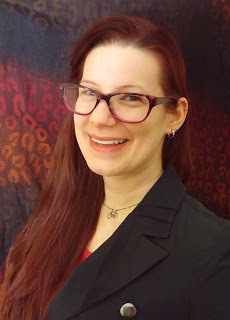
When I first started writing the book that got me my agent, I was in a slump from giving up querying my first MS. I trunked it and felt so empty inside. I had worked on that first manuscript for years, it was my baby, and I just didn’t know how to fix it. I had a few ideas for a new MS, but nothing really SPOKE to me. Nothing was shiny enough. Nothing SPARKLED.
Until I had a dream. It was only a short scene, but the feeling it gave inspired my new MS. I started thinking about the feeling and imagery. I started questioning what was going on, why, who? Until my mind was consumed with this world and the characters. I started writing it in May 2014. I finished it in December and sent it off to CPs and Betas.
I started querying and joined The Writer’s Voice contest. I got picked for Monica and Stephanie’s team, and was so ecstatic. When the agent round came, I didn’t get any requests. None. But I made a lot of great friends, and continued my journey.
In late October, after a good amount of requests and an even larger abundance of Rejections, I got my first offer. I was ecstatic. I flailed and messaged all my CPs and friends and flails some more.
Then I put on my professional pants and asked for two weeks, Nov 4th, for other agents to get back and to contact their other authors. This was a bit of an odd circumstance because the agent couldn’t talk to me on the phone between their scheduled events at the time, and was also talking to me through an assistant.
The following week, I got my second offer! This was an agent who only had my query when I followed up with my offer of rep. She immediately asked for the full. (This is why it’s so important to send out notices to all the agents, even those who have just your query.)
We talked on the phone and I was super awkward. Everything in my brain just dumped out and I was so scared she would realize that I was a flailing phony and walk away slowly. She asked me if I wrote anything else, and I was like ‘no’ and then immediately remembered I co-write a space opera on wattpad and facepalmed a million times. My brain was just mush. The questions I researched and printed out were a garble of words in front of me.
But she didn’t back away! The notes she gave and what she told me about her vision for the book just made me feel so… good. She loved my Manuscript! My words! She liked them! She really liked them! I felt like this was how it should be with an agent, and that was pretty much when I made my decision to go with her.
On November 4th. I emailed and accepted her offer. Within the week, I had signed and emailed back the contract and was officially represented by the wonderful Christa Heschke at the McIntosh & Otis Agency!
It took me 7 months to write my book. And then another seven months to get my agent. Let’s see if the future brings some more lucky 7s.
_______________________________________________
Born and (mostly) raised in Plymouth, Massachusetts, Ellie was usually found outside, building forts and having stick fights with the neighborhood kids. (She always won.) After majoring in graphic design in High school, with the dream of becoming a manga-ka, she went to college for Media Arts & Animation in Brookline, MA, where she got her Bachelor’s degree before she found a job in Accounting, (Yeah, weird) and also started to seriously read and write. She still doodles and draws on random scraps of papers, sticky notes, and whatever else is around.
She currently resides right outside of Boston with her boyfriend and Cat.
Twitter: @ByEllieMWeb: http://byelliem.blogspot.com/

When I first started writing the book that got me my agent, I was in a slump from giving up querying my first MS. I trunked it and felt so empty inside. I had worked on that first manuscript for years, it was my baby, and I just didn’t know how to fix it. I had a few ideas for a new MS, but nothing really SPOKE to me. Nothing was shiny enough. Nothing SPARKLED.
Until I had a dream. It was only a short scene, but the feeling it gave inspired my new MS. I started thinking about the feeling and imagery. I started questioning what was going on, why, who? Until my mind was consumed with this world and the characters. I started writing it in May 2014. I finished it in December and sent it off to CPs and Betas.
I started querying and joined The Writer’s Voice contest. I got picked for Monica and Stephanie’s team, and was so ecstatic. When the agent round came, I didn’t get any requests. None. But I made a lot of great friends, and continued my journey.
In late October, after a good amount of requests and an even larger abundance of Rejections, I got my first offer. I was ecstatic. I flailed and messaged all my CPs and friends and flails some more.
Then I put on my professional pants and asked for two weeks, Nov 4th, for other agents to get back and to contact their other authors. This was a bit of an odd circumstance because the agent couldn’t talk to me on the phone between their scheduled events at the time, and was also talking to me through an assistant.
The following week, I got my second offer! This was an agent who only had my query when I followed up with my offer of rep. She immediately asked for the full. (This is why it’s so important to send out notices to all the agents, even those who have just your query.)
We talked on the phone and I was super awkward. Everything in my brain just dumped out and I was so scared she would realize that I was a flailing phony and walk away slowly. She asked me if I wrote anything else, and I was like ‘no’ and then immediately remembered I co-write a space opera on wattpad and facepalmed a million times. My brain was just mush. The questions I researched and printed out were a garble of words in front of me.
But she didn’t back away! The notes she gave and what she told me about her vision for the book just made me feel so… good. She loved my Manuscript! My words! She liked them! She really liked them! I felt like this was how it should be with an agent, and that was pretty much when I made my decision to go with her.
On November 4th. I emailed and accepted her offer. Within the week, I had signed and emailed back the contract and was officially represented by the wonderful Christa Heschke at the McIntosh & Otis Agency!
It took me 7 months to write my book. And then another seven months to get my agent. Let’s see if the future brings some more lucky 7s.
_______________________________________________
Born and (mostly) raised in Plymouth, Massachusetts, Ellie was usually found outside, building forts and having stick fights with the neighborhood kids. (She always won.) After majoring in graphic design in High school, with the dream of becoming a manga-ka, she went to college for Media Arts & Animation in Brookline, MA, where she got her Bachelor’s degree before she found a job in Accounting, (Yeah, weird) and also started to seriously read and write. She still doodles and draws on random scraps of papers, sticky notes, and whatever else is around.
She currently resides right outside of Boston with her boyfriend and Cat.
Twitter: @ByEllieMWeb: http://byelliem.blogspot.com/
Published on March 31, 2016 04:30
March 29, 2016
Getting the Call with Karen McManus
It's always wonderful to share a success story from a former contest veteran. Karen was one of Mike's picks for our recent Nightmare on Query Street! Congrats, Karen!
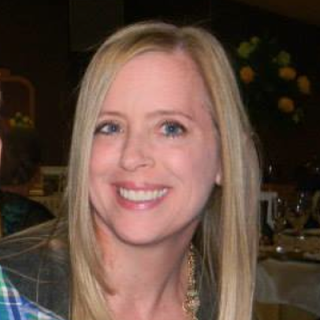
I was one of those kids who wrote constantly. By middle school, I had an entire library of books I’d written and (badly) illustrated. But once I started the college-career-family trajectory, I let my interest in writing slide.
A few years ago I started reading YA books and was inspired to try my hand at writing again. I spent months writing at night and on weekends, and for the first time since my childhood, I finished a book.
Not a GOOD book, though.
It was a classic first effort that should have been trunked as a learning experience. In late 2014 I didn’t have critique partners or beta readers. Nobody except my sister and a friend had read ever my book. While it had some characters I still love, it also had gaping plot holes, pacing problems, and so much first-chapter exposition that my MC sounded like a tour guide. Plus it was dystopian-themed, which had been off-trend for years.
But I didn’t know any of that. I attempted my first query, which was basically plot teasers and adverbs strung together with clichés like “she doesn’t fit the mold.” Which mold? Who knows. I didn’t specify.
Not surprisingly, my inbox was a mixture of crickets and form rejections.
A breakthrough came when I joined Twitter in spring 2015 and met other writers. I found my first critique partner, who became my writing soul sister. I learned the market and studied writing as a craft, reworking both my query and my novel. I gave PitMad a try. I participated in a YA first-page critique party and met another amazingly talented CP. But while I finally managed to eke out a few agent requests, I realized my first manuscript was fundamentally flawed and put it aside.
(I did enter that MS into the 2015 PitchWars as sort of a Hail Mary, hoping one of the mentors I applied to might help me fix it. They all quite rightly turned me down.)
I wrote another book, a YA contemporary fantasy my CPs praised, and started querying in the fall. I had a better request-to-rejection ratio than my first manuscript, but still heard “just not for me” plenty of times. Then in October I entered Nightmare on Query Street (NoQS), a contest run by Michelle Hauck and Michael Anthony, and was chosen for Michael’s team. That was a huge confidence booster that came with bonus helpful mentoring.
I received three contest requests, but I’d also gotten a couple passes on querying fulls. Things were moving slowly—one step forward, one step back.
Meanwhile, back in September, I’d been inspired with an idea for a third book, a YA contemporary mystery. I wrote it madly in every spare minute—the characters completely took over my brain—and finished a draft in two months. My CPs thought it was The Book, but I wasn’t sure. I put it away for a few weeks, and when I came back to it I saw clearly what plot threads had to be reworked.
I’d met some amazing beta readers during NoQS, and they helped me revise more intensively than I ever had before. I took every opportunity I could find for additional feedback, searching for common issues that tripped readers up and trying to fix them. It was a complete 180 from my early days of writing in a vacuum.
In January 2016 I was ready to jump back into the querying trenches. I’d gotten a subscription to Publishers Marketplace, and had carefully researched agents I thought would be a good fit for my book and the career I wanted to have. I kept getting drawn to Rosemary Stimola’s website, admiring her list and the editors she’d worked with. So one Friday afternoon, I took a deep breath and submitted a query via her online form.
She requested the full three hours later. I’ll let you imagine the unprofessional flailing about that followed.
I sent my manuscript and settled in for a long wait, submitting a few more queries and getting additional requests. I also drove myself crazy looking at QueryTracker statistics and preparing for what felt like inevitable disappointment. But when Rosemary emailed a week and a half later, she wanted to set up a time to talk.
Flailing. Unprofessional. Lots of it, again.
When Rosemary offered representation, her vision for the book was so perfectly in line with mine that I was tempted to accept on the spot. But I had other fulls out between my second manuscript and this new one, and needed to give those agents a chance to read. By the end of the week I had additional offers and considered them carefully, but ultimately Rosemary’s immediate connection to the book won me over. I happily signed with her in February.
I learned a lot while querying, but the lessons that stuck with me the most are these: Connect with other writers. Constantly improve your craft. Above all, even (or especially) when you doubt whether you have what it takes, keep writing. Don’t give up. You never know which of the projects you’re working on will turn out to be The Book.
Updated: In news of the pinch-me-I’m-dreaming variety, Delacorte Press will be publishing my debut and a second book, which is the best postscript I could ever have hoped to add.
Karen McManus writes contemporary and fantasy YA, and is represented by Rosemary Stimola of Stimola Literary Studio. Her debut, ONE OF US IS LYING, about the fallout from death of a high school student who created a gossip app and its impact on the four teens whose secrets he was about to reveal, is forthcoming from Delacorte Press.
You can find her on Twitter @writerkmc and at www.karenmcmanus.com.

I was one of those kids who wrote constantly. By middle school, I had an entire library of books I’d written and (badly) illustrated. But once I started the college-career-family trajectory, I let my interest in writing slide.
A few years ago I started reading YA books and was inspired to try my hand at writing again. I spent months writing at night and on weekends, and for the first time since my childhood, I finished a book.
Not a GOOD book, though.
It was a classic first effort that should have been trunked as a learning experience. In late 2014 I didn’t have critique partners or beta readers. Nobody except my sister and a friend had read ever my book. While it had some characters I still love, it also had gaping plot holes, pacing problems, and so much first-chapter exposition that my MC sounded like a tour guide. Plus it was dystopian-themed, which had been off-trend for years.
But I didn’t know any of that. I attempted my first query, which was basically plot teasers and adverbs strung together with clichés like “she doesn’t fit the mold.” Which mold? Who knows. I didn’t specify.
Not surprisingly, my inbox was a mixture of crickets and form rejections.
A breakthrough came when I joined Twitter in spring 2015 and met other writers. I found my first critique partner, who became my writing soul sister. I learned the market and studied writing as a craft, reworking both my query and my novel. I gave PitMad a try. I participated in a YA first-page critique party and met another amazingly talented CP. But while I finally managed to eke out a few agent requests, I realized my first manuscript was fundamentally flawed and put it aside.
(I did enter that MS into the 2015 PitchWars as sort of a Hail Mary, hoping one of the mentors I applied to might help me fix it. They all quite rightly turned me down.)
I wrote another book, a YA contemporary fantasy my CPs praised, and started querying in the fall. I had a better request-to-rejection ratio than my first manuscript, but still heard “just not for me” plenty of times. Then in October I entered Nightmare on Query Street (NoQS), a contest run by Michelle Hauck and Michael Anthony, and was chosen for Michael’s team. That was a huge confidence booster that came with bonus helpful mentoring.
I received three contest requests, but I’d also gotten a couple passes on querying fulls. Things were moving slowly—one step forward, one step back.
Meanwhile, back in September, I’d been inspired with an idea for a third book, a YA contemporary mystery. I wrote it madly in every spare minute—the characters completely took over my brain—and finished a draft in two months. My CPs thought it was The Book, but I wasn’t sure. I put it away for a few weeks, and when I came back to it I saw clearly what plot threads had to be reworked.
I’d met some amazing beta readers during NoQS, and they helped me revise more intensively than I ever had before. I took every opportunity I could find for additional feedback, searching for common issues that tripped readers up and trying to fix them. It was a complete 180 from my early days of writing in a vacuum.
In January 2016 I was ready to jump back into the querying trenches. I’d gotten a subscription to Publishers Marketplace, and had carefully researched agents I thought would be a good fit for my book and the career I wanted to have. I kept getting drawn to Rosemary Stimola’s website, admiring her list and the editors she’d worked with. So one Friday afternoon, I took a deep breath and submitted a query via her online form.
She requested the full three hours later. I’ll let you imagine the unprofessional flailing about that followed.
I sent my manuscript and settled in for a long wait, submitting a few more queries and getting additional requests. I also drove myself crazy looking at QueryTracker statistics and preparing for what felt like inevitable disappointment. But when Rosemary emailed a week and a half later, she wanted to set up a time to talk.
Flailing. Unprofessional. Lots of it, again.
When Rosemary offered representation, her vision for the book was so perfectly in line with mine that I was tempted to accept on the spot. But I had other fulls out between my second manuscript and this new one, and needed to give those agents a chance to read. By the end of the week I had additional offers and considered them carefully, but ultimately Rosemary’s immediate connection to the book won me over. I happily signed with her in February.
I learned a lot while querying, but the lessons that stuck with me the most are these: Connect with other writers. Constantly improve your craft. Above all, even (or especially) when you doubt whether you have what it takes, keep writing. Don’t give up. You never know which of the projects you’re working on will turn out to be The Book.
Updated: In news of the pinch-me-I’m-dreaming variety, Delacorte Press will be publishing my debut and a second book, which is the best postscript I could ever have hoped to add.
Karen McManus writes contemporary and fantasy YA, and is represented by Rosemary Stimola of Stimola Literary Studio. Her debut, ONE OF US IS LYING, about the fallout from death of a high school student who created a gossip app and its impact on the four teens whose secrets he was about to reveal, is forthcoming from Delacorte Press.
You can find her on Twitter @writerkmc and at www.karenmcmanus.com.
Published on March 29, 2016 04:30
March 28, 2016
Which Came First: The Writer or The Angst
Writers seem to be emotional people. We worry. We fret the details. We grieve and get down. We spin up on cloud nine. We have more empathy than most. Writers seem to have their hearts on their sleeves. Don't get me wrong, we're a tough lot also. Thick skin comes with being a writer after any length of time.
But it often gets me wondering a certain chicken or the egg scenario: Are we writers because we feel more or Do we feel more because we write? There is a slight difference. Does the fact that we have that large share of empathy turn us into writers and somehow make us fit into that profession? Are we just an emotional bunch and writing lets us express that and get it out of our system?
Or does writing so many difficult situations and hitting our main characters with so many emotional problems cause writers to suffer the corresponding emotions.
I almost never cry for myself. Rejections sting, and of course, make me get down on life, but it's not until I see someone else suffering that my emotions really come out. I sympathize and find it too easy to imagine myself in their situation. That's when my heart really grieves. It's even true for fictional people. I still can't re-read Grudging without shedding tears at certain scenes because the characters' heartbreak becomes mine. With deadly stakes and scenes of loss, just writing the series often puts the real me in a funk of dark thoughts. I laugh less during the months I write. I suffer along with the characters.
But I'm also the kind of person who cries at a heartwarming movie, or even a stinking commercial for goodness sake. Tears also come when I get angry and try to form that into words--basically whenever I feel very strongly about something. I wish it wasn't so, but it's part of what makes me. On the other hand, small things like seeing my favorite cosplay character or getting a book in the mail send me into happy dances. I've always been emotional.
I guess the answer doesn't really matter. Whether the writing makes the emotion or it was there all along, the important part is putting that angst into our writing. Being able to move other people with words is a true talent. We, as writers, make other people feel by sharing our own emotion on topics large and small. That can move the world.
Are you emotional? Do you feel a character's plight too much? Does it hurt when they die? Do you cry at movies and can watching the nightly news make you too depressed for words? Then you're probably a writer--rejoice!
But it often gets me wondering a certain chicken or the egg scenario: Are we writers because we feel more or Do we feel more because we write? There is a slight difference. Does the fact that we have that large share of empathy turn us into writers and somehow make us fit into that profession? Are we just an emotional bunch and writing lets us express that and get it out of our system?
Or does writing so many difficult situations and hitting our main characters with so many emotional problems cause writers to suffer the corresponding emotions.
I almost never cry for myself. Rejections sting, and of course, make me get down on life, but it's not until I see someone else suffering that my emotions really come out. I sympathize and find it too easy to imagine myself in their situation. That's when my heart really grieves. It's even true for fictional people. I still can't re-read Grudging without shedding tears at certain scenes because the characters' heartbreak becomes mine. With deadly stakes and scenes of loss, just writing the series often puts the real me in a funk of dark thoughts. I laugh less during the months I write. I suffer along with the characters.
But I'm also the kind of person who cries at a heartwarming movie, or even a stinking commercial for goodness sake. Tears also come when I get angry and try to form that into words--basically whenever I feel very strongly about something. I wish it wasn't so, but it's part of what makes me. On the other hand, small things like seeing my favorite cosplay character or getting a book in the mail send me into happy dances. I've always been emotional.
I guess the answer doesn't really matter. Whether the writing makes the emotion or it was there all along, the important part is putting that angst into our writing. Being able to move other people with words is a true talent. We, as writers, make other people feel by sharing our own emotion on topics large and small. That can move the world.
Are you emotional? Do you feel a character's plight too much? Does it hurt when they die? Do you cry at movies and can watching the nightly news make you too depressed for words? Then you're probably a writer--rejoice!
Published on March 28, 2016 04:30
March 24, 2016
Convention Expectations
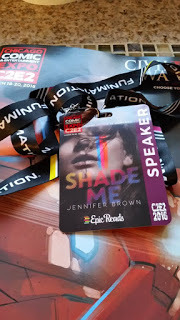
I took a trip to Chicago last weekend for the Chicago Comic and Entertainment Expo or C2E2. My publisher got a couple of us on panels, and I was scheduled to join five other authors from different publishers to talk about Fight the Power for one hour, with a book signing afterward. I'd never been to a Con, let alone one as big as this. For those who don't know, C2E2 is sort of like the grand-daddy of all SFF Cons in San Diego but with much fewer important announcements and premiers. You will still see a lot of this:
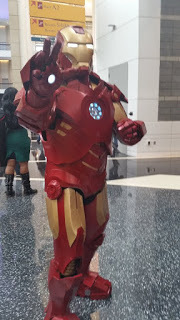
But there are not a lot of celebrities--at least not A-list ones. Still, the Con is huge with lots to see and do and there are huge crowds. You could walk among the vendors all day and not see it all. This will show how big it is: My sister and I got there before it opened for the day. We secured our badges, then went and got something to eat before getting in line. The line was like thirty people wide and I'm not kidding you that it took ten minutes after the doors opened for our part of the line to start moving. Ten minutes until we could even shuffle forward. There were just that many people waiting to get in. So a pretty big convention.
And I was going to speak in front of a crowd. This is what part of it looked like:

I was excited and plenty nervous. My stomach was feeling it on the drive up to Chicago. But the topic of my panel suited me so well so I also felt an edge of confidence. We were to answer questions on revolution in fiction and the little guy/underdog taking on the man. Right up my alley as a writer of epic fantasy! I write it and I've read dozens of books about it. I'd thought on the subject. And you know, once I got there, I forgot about being nervous. There was just so much to see and take pictures of! And I'm mainly talking about the people and the costumes. It was so crazy diverse and some of the costumes were just amazing. Look at this homemade Mad Max. It could be the real thing from the movie.
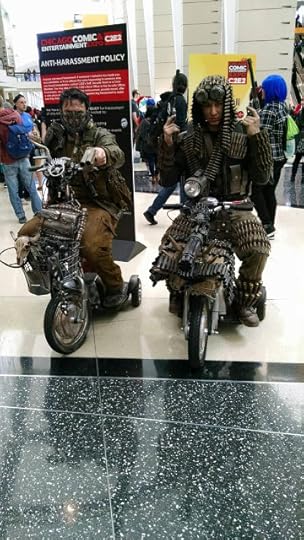
My panel wasn't until 12:30 and we had two hours to walk around and look at all the geeky things for sale. I bought a time turner necklace from Harry Potter and a Firefly t-shirt. My sister got two Walking Dead shirts. But the first thing we did was run to the Del Rey booth. Our Con program listed all the booths and had a map and we spent our time in line making a strategy. As soon as we got in, we went right--well not right, because we got lost a couple of times. It's like a maze in there.--for the book giveaway. I'd seen the day before that Del Rey was giving away copies of the new Michael J. Sullivan ARC. Thank you twitter for that tip! But freebies go fast. We got five or six books each and we're able to go back an hour later and get one of them signed.
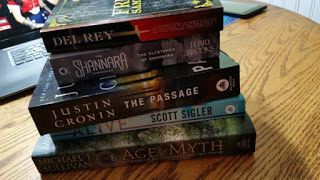
We didn't get to check out a quarter of the booths or artists in Artist Alley before it was time to head upstairs where the panel rooms are located. We passed this on the escalator. (Went passed Angimon from Digimon and his big wings on the way back down. Wish I had a picture.)

Oh and I found Rey. She was in the lobby. Who knew?
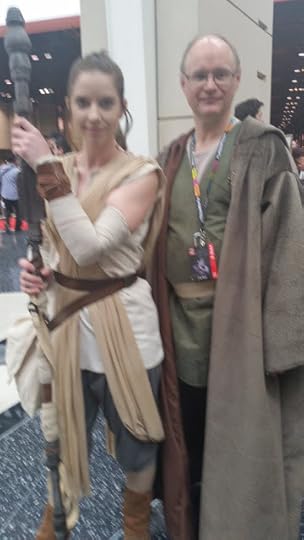
So yes. The panel. My nerves all came back. Sweaty hands and all that stuff. I was worried about using a microphone. Nervous about knowing what to say. Nervous about blabbering a bunch of boring crap. But it went well. The moderator introduced us and let us say three things about ourselves. Then she took audience questions and gave us all time to answer them. I let the first one pass me by, but jumped in on the second. I believe I made a few good points like about how characters manage to face such huge and overwhelming stakes.
I was very glad that at the last minute I packed one of my books into my bag. Here's a tip: you want a book with you to put up on the panel table. It makes you feel impressive. Oh and take someone with you. A big thanks to my sister for holding my hand and holding my bag full of free books!
All the other panelists with me had done talks at lots of conventions before. One was a full-time writer with over thirty books out. I'm looking at you, Rachel. They were all very encouraging of the newbie among them. I can't thank Arwen, Lisa, Rachel, and Michi enough for that. It went really fast and was soon over. We headed back downstairs to the Con floor for the signing.
There was a really long line waiting for signatures. Unfortunately, that line belong to the comic book person at the table next to us. Another tip: Fan conventions aren't really the place to get noticed unless you already have a big following. If you're new, you're just going to be a blip.
I spread out my bookmarks and stood up my copy of Grudging and I signed a few books. Met a few friends from twitter. (Hi Ann and Jane!) But the other highlight from the signing was spending the time talking with another author from Harper Voyager (Hi Bishop! Thanks for keeping me company.) and the authors from my panel. Talking with authors who understand you is such a bonus!
After the signing, my sister and I hurried back upstairs to catch Bishop's panel. He was a moderator. Talk about nervous. At least I didn't have that worry! By then it was later into the afternoon. We took a few more pictures of cosplay and headed home. As we were going out, my favorite cosplay of the day was right in front of me waiting for the escalator. I think I squealed and scared my sister when I saw Toph from the Last Avatar in front of me. She looks perfect and really ended the day on a high note!
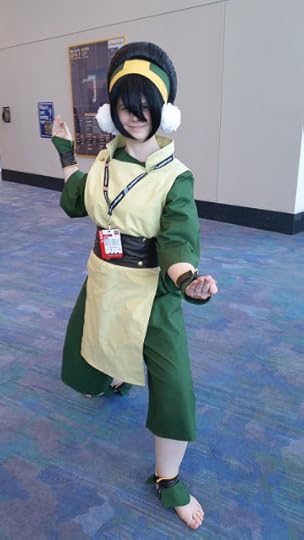
So keep in mind that most of the people at fan conventions, at least SFF ones, are there for the comics and the merchandise, not for books or authors. There were about 50 to 60 people at my panel. Cons are more for having fun, getting some experience, meeting people and mingling, and less about selling books. I took so many photos, had a blast, and would gladly do it again.
Published on March 24, 2016 05:33
March 22, 2016
Getting the Call with Anna Priemaza
Sometimes you just know when an agent is right for you. Enjoy this inspiration from Anna Priemaza and here is to hoping for more good things around the corner.
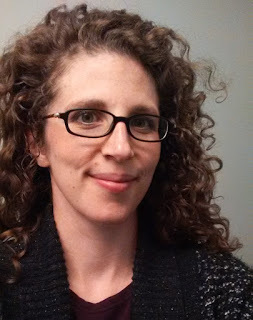
"I’d love to talk to you about [your manuscript]," the email said. "Do you have some time to talk today?"
Literary agent Lauren Abramo of DGLM wanted to talk! To me! Fortunately, I knew just what to do.
Step one: Stare at email in disbelief for ten minutes.
Step two: Email Lauren back to set up chat for 20 minutes away. Enough time to pull myself together. Hopefully.
Step three: Text hubby and my mom. Forward email to my crit group with the very coherent message "!!!!!! See below !!!!"
Step four: Print off the "getting the call" blog post I had saved to my favourites bar on an unusually optimistic day and highlight the questions I wanted to ask. (This one: http://www.literaryrambles.com/2010/02/call-or-what-to-ask-literary-agent-when.html
Step five: Pace back and forth in my office trying not to hyperventilate.
Step six: Answer the phone and try not to sound like an utter fool.
But let's rewind one week;
Another rejection. I laid my head in my hands. This book, IF YOU CAN'T FLY, was not going to be THE book. I resolved myself to this inevitable truth. Sure, I still had two fulls and a dozen or so queries out. But over the last three months, I had received over thirty rejections, including three partial rejections, which surely meant more rejections to come. And sure, I had that R&R with the lovely comments about my characters I could still do. But her feedback just wasn't resonating with me.
So it wasn't going to be this book that I signed with an agent for. I knew it in my heart. I emailed one of my CPs and told her that maybe it would be the next book. Or the one after that.
After all, it hadn't been my previous book, which I had queried two years earlier. That one garnered forty-seven rejections, including six partial rejections, and then died. And now IF YOU CAN'T FLY was going to die a sad death, too. I knew it to be true.
Fast forward one week and one hour:
It turns out I don't have the ability to see the future because one week, one hour, and one telephone call later, I had an offer of representation for IF YOU CAN'T FLY from Lauren Abramo of DGLM! Happy dance.
Lauren was wonderful on the phone, but of course I did the polite thing and emailed the other agents who had my query or MS and gave them a week to respond. (I emailed all agents who had my query because, dudes, I got to send emails with the subject heading "Offer of Representation"; I was sending as many of those as I could!)
I told the other agents I'd promised to let Lauren know by Thursday. By Monday, I couldn't take the waiting. "Can't I just accept her offer?" I whined to my crit group (also known as my Anna-craziness-support-group). "Who cares about those other agents?"
Their answer was unanimous and exactly what I knew they'd say. "No. You have to wait until the deadline." They did, however, suggest that I request a copy of DGLM's agency agreement to look over in the meantime.
Which was a great idea because not only did I get to look over the agreement, but I exchanged some emails back and forth with Lauren and became even more impressed with her and how brilliant and helpful she seemed. By Wednesday, most agents had kindly stepped aside, and I had my email to Lauren accepting her offer all typed up and saved in my drafts folder, ready to send the very next morning.
And then I got an email from another agent. She loved my query and pages and was willing to read the manuscript that night and potentially set up a call for the next day in order to meet the Thursday deadline. BUT, she was only willing to rush to do so if there was actually a decent chance I'd sign with her.
I sat and stared at my computer for a full hour. Not a partial hour. A full one.
And then I emailed her back. No, there was not a decent chance I'd sign with her. She seemed lovely and under other circumstances I would've been thrilled to sign with her, but my heart was set on Lauren.
And having decided that, I rebelliously sent Lauren my "I accept" email late Wednesday night instead of waiting until Thursday morning. And did another happy dance.
Fast forward another three and a half months to when Lauren called with HarperTeen's offer.
But that's a happy dance story for another time.
----------------------------------
Anna Priemaza is a contemporary young adult author and a practicing family and immigration lawyer in Edmonton, Alberta, where she lives with her husband. She can never quite remember how old she is, as she knits like an old lady, practices law like an adult, fangirls over YouTubers like a teen, and dreams like a child.
Her debut, IF YOU CAN'T FLY, about two teens who meet working on a science fair project and form the first real friendship either has ever had by bonding over panic attacks, ADHD, and their mutual obsession with a YouTube star who does walkthroughs of their favorite video game, is forthcoming from HarperTeen in Fall 2017.
Twitter: https://twitter.com/annab311aWebsite: http://annapriemaza.com/Goodreads: https://www.goodreads.com/book/show/29480316-if-you-can-t-fly

"I’d love to talk to you about [your manuscript]," the email said. "Do you have some time to talk today?"
Literary agent Lauren Abramo of DGLM wanted to talk! To me! Fortunately, I knew just what to do.
Step one: Stare at email in disbelief for ten minutes.
Step two: Email Lauren back to set up chat for 20 minutes away. Enough time to pull myself together. Hopefully.
Step three: Text hubby and my mom. Forward email to my crit group with the very coherent message "!!!!!! See below !!!!"
Step four: Print off the "getting the call" blog post I had saved to my favourites bar on an unusually optimistic day and highlight the questions I wanted to ask. (This one: http://www.literaryrambles.com/2010/02/call-or-what-to-ask-literary-agent-when.html
Step five: Pace back and forth in my office trying not to hyperventilate.
Step six: Answer the phone and try not to sound like an utter fool.
But let's rewind one week;
Another rejection. I laid my head in my hands. This book, IF YOU CAN'T FLY, was not going to be THE book. I resolved myself to this inevitable truth. Sure, I still had two fulls and a dozen or so queries out. But over the last three months, I had received over thirty rejections, including three partial rejections, which surely meant more rejections to come. And sure, I had that R&R with the lovely comments about my characters I could still do. But her feedback just wasn't resonating with me.
So it wasn't going to be this book that I signed with an agent for. I knew it in my heart. I emailed one of my CPs and told her that maybe it would be the next book. Or the one after that.
After all, it hadn't been my previous book, which I had queried two years earlier. That one garnered forty-seven rejections, including six partial rejections, and then died. And now IF YOU CAN'T FLY was going to die a sad death, too. I knew it to be true.
Fast forward one week and one hour:
It turns out I don't have the ability to see the future because one week, one hour, and one telephone call later, I had an offer of representation for IF YOU CAN'T FLY from Lauren Abramo of DGLM! Happy dance.
Lauren was wonderful on the phone, but of course I did the polite thing and emailed the other agents who had my query or MS and gave them a week to respond. (I emailed all agents who had my query because, dudes, I got to send emails with the subject heading "Offer of Representation"; I was sending as many of those as I could!)
I told the other agents I'd promised to let Lauren know by Thursday. By Monday, I couldn't take the waiting. "Can't I just accept her offer?" I whined to my crit group (also known as my Anna-craziness-support-group). "Who cares about those other agents?"
Their answer was unanimous and exactly what I knew they'd say. "No. You have to wait until the deadline." They did, however, suggest that I request a copy of DGLM's agency agreement to look over in the meantime.
Which was a great idea because not only did I get to look over the agreement, but I exchanged some emails back and forth with Lauren and became even more impressed with her and how brilliant and helpful she seemed. By Wednesday, most agents had kindly stepped aside, and I had my email to Lauren accepting her offer all typed up and saved in my drafts folder, ready to send the very next morning.
And then I got an email from another agent. She loved my query and pages and was willing to read the manuscript that night and potentially set up a call for the next day in order to meet the Thursday deadline. BUT, she was only willing to rush to do so if there was actually a decent chance I'd sign with her.
I sat and stared at my computer for a full hour. Not a partial hour. A full one.
And then I emailed her back. No, there was not a decent chance I'd sign with her. She seemed lovely and under other circumstances I would've been thrilled to sign with her, but my heart was set on Lauren.
And having decided that, I rebelliously sent Lauren my "I accept" email late Wednesday night instead of waiting until Thursday morning. And did another happy dance.
Fast forward another three and a half months to when Lauren called with HarperTeen's offer.
But that's a happy dance story for another time.
----------------------------------
Anna Priemaza is a contemporary young adult author and a practicing family and immigration lawyer in Edmonton, Alberta, where she lives with her husband. She can never quite remember how old she is, as she knits like an old lady, practices law like an adult, fangirls over YouTubers like a teen, and dreams like a child.
Her debut, IF YOU CAN'T FLY, about two teens who meet working on a science fair project and form the first real friendship either has ever had by bonding over panic attacks, ADHD, and their mutual obsession with a YouTube star who does walkthroughs of their favorite video game, is forthcoming from HarperTeen in Fall 2017.
Twitter: https://twitter.com/annab311aWebsite: http://annapriemaza.com/Goodreads: https://www.goodreads.com/book/show/29480316-if-you-can-t-fly
Published on March 22, 2016 04:30

